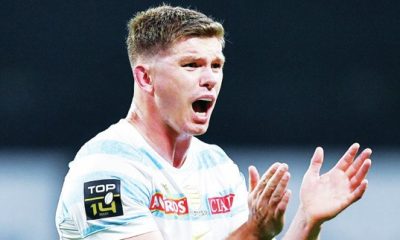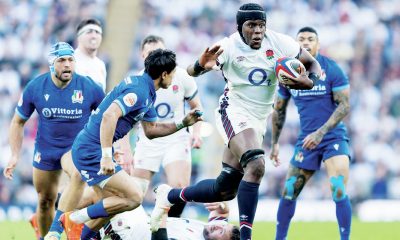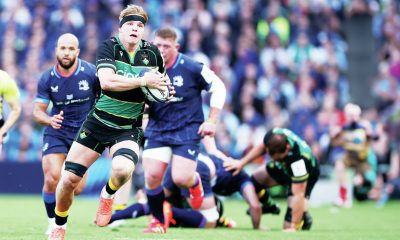
 No one speaks with more authority and knowledge about the British & Irish Lions than Sir Ian McGeechan, who was head coach a record four times – 1989, 1993, 1997 and 2009 – and midweek coach on the last tour to New Zealand in 2005.
No one speaks with more authority and knowledge about the British & Irish Lions than Sir Ian McGeechan, who was head coach a record four times – 1989, 1993, 1997 and 2009 – and midweek coach on the last tour to New Zealand in 2005.
Indeed, Sir Ian’s autobiography, published in 2009, is entitled Lion Man, and in case the younger generation regard him as a successful coach only, it should be pointed out that McGeechan, knighted in 2010, played in eight Tests for the Lions against South Africa and New Zealand in 1974 and 1977, as well as being capped 32 times by Scotland.
A personal friend of John Spencer, the 2017 Lions manager, it’s hardly surprising that the two have spoken regularly about the set-up that’s required if the Test team are to make history by becoming the first Lions side to beat the All Blacks in a series since their famous one and only triumph in 1971.
Sir Ian also knows intimately the thinking of coach Warren Gatland, below, his assistant on the 2009 tour to South Africa, so a week after the squad was announced, how does he rate their chances of winning?
“I think they are good enough to beat New Zealand. In terms of quality, it’s an outstanding squad. It can definitely challenge the All Blacks who are favourites because they are world champions and they very rarely lose at home.
“Of all the international sides to take on New Zealand, the Lions’ potential to win is far greater. I think this tour will be very different to 2005 (Lions lost 3-0) in that Warren as a New Zealander knows how much the Lions have to respect and get to know the New Zealand environment and if you respect their rugby then you’ve got a chance of beating it.
“The whole squad has options and variety and it’s got clever players. Yes, you need physicality and there are a lot of big men, but you also need dynamic physicality, so you’ve got players who are confident in space and confident on one-to-one with a defender.
“The centres have a good mix of pace and power and genuine steppers with genuine speed. I’ve always liked the look of Ireland‘s Robbie Henshaw. He played exceptionally well against New Zealand in Chicago, so he’ll be a handful. I think it’s too early to be talking about who’ll play at 10 or 12. On paper, the two real Test animals are Jonathan Sexton and Owen Farrell. They are good decision makers. The critical thing here will be time together. You’ve got to develop the combination but in terms of quality and competitiveness there’s a strong unit there.
“As to the criticism that Gatland’s approach is based on Warrenball, to be honest it’s a meaningless term invented by someone who didn’t understand what they were watching. Yes, you need big men, but you need to be on the front foot to play at pace and that’s what New Zealand do as well.
“So the real essence of this tour party will be the ability to vary where they put their runners. Sometimes, they’ll be big men with support and sometimes speed merchants and steppers to attack the defence.”
Ireland’s sensational win in Chicago against New Zealand last November is reflected by the selection of 11 Irishmen who, crucially, know how to beat the All Blacks.
“I think the result was significant. The biggest significance for me was that New Zealand were pressurised into making errors in the latter stages. So you could see in the right circumstances they can be put under pressure.
“But you’ve got to put the result into context. Ireland played them without their first choice second row of Sam Whitelock and Brodie Retallick, and the way New Zealand play, they are very important. Similarly, the Lions have some genuine rugby players in the second row. More than anything else that’s the way the game has moved on. The back five in the forwards now show what they can do and they tie in with the midfield.”
As a former Scottish international and coach when Scotland won the Grand Slam in 1990, does McGeechan feel that his country were short-changed as only two Scots – winger Tommy Seymour and full back Stuart Hogg – were picked despite excellent wins against Ireland and Wales?
“You’d like to see another couple, but you can’t argue with the selections. You’ve got to respect the coaches and there’s a good argument for every player who’s been selected for having him in. I’d like to have seen Finn Russell there or thereabouts because in a Lions environment he would have grown and we’d have seen something different.”
Looking ahead to the Saturday Tests – June 24 in Auckland, at Wellington on July 1 and then back to Eden Park for the final one on July 8 – McGeechan is delighted that in such an intimidating atmosphere, the second and third internationals will be officiated by two French referees, Jerome Garces and Romain Poite.
“In my opinion, the French have the best referees because they manage the set-piece and the breakdowns well and ultimately that allows the game to flow. They are not afraid to penalise things which get very close to breaking the laws.
“I think some of the French refereeing in the Six Nations was outstanding. They do not get upset or pressurised and that could be an important factor.”
Inevitably, the Lion Man will be on duty during the series; before the Tests he’ll be in London analysing the provincial games for Sky and then he flies to New Zealand to broadcast for Sky and to write his column for a national newspaper.
GUY WILLIAMS


British and Irish Lions
Go with your boy for the British and Irish Lions, Lawrence Dallaglio tells Andy Farrell

Latest News
Bears aim to cash in on Big Day Out
























You must be logged in to post a comment Login